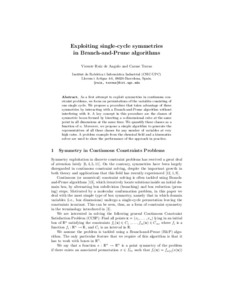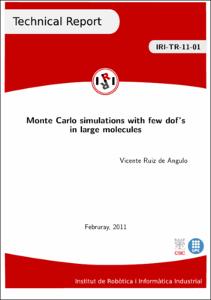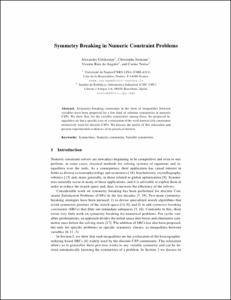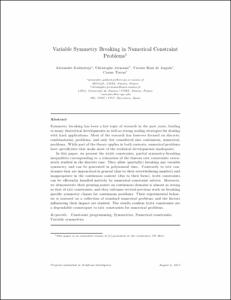Exploració per autor "Ruiz de Angulo García, Vicente"

Ara es mostren els items 1-10 de 10
-
Exploiting single-cycle symmetries in branch-and-prune algorithms

Ruiz de Angulo García, Vicente; Torras, Carme (Springer Verlag, 2007)
Ruiz de Angulo García, Vicente; Torras, Carme (Springer Verlag, 2007)
Capítol de llibre
Accés obertAs a first attempt to exploit symmetries in continuous con- straint problems, we focus on permutations of the variables consisting of one single cycle. We propose a procedure that takes advantage of these symmetries by ... -
Exploiting single-cycle symmetries in branch-and-prune algorithms

Ruiz de Angulo García, Vicente; Torras, Carme (2007)
Ruiz de Angulo García, Vicente; Torras, Carme (2007)
Text en actes de congrés
Accés obertAs a first attempt to exploit symmetries in continuous constraint problems, we focus on permutations of the variables consisting of one single cycle. We propose a procedure that takes advantage of these symmetries by ... -
Exploiting single-cycle symmetries in continuous constraint problems

Ruiz de Angulo García, Vicente; Torras, Carme (2007)
Ruiz de Angulo García, Vicente; Torras, Carme (2007)
Report de recerca
Accés obertSymmetries in discrete constraint satisfaction problems have been explored and exploited in the last years, but symmetries in continuous constraint problems have not received the same attention. Here we focus on permutations ... -
General robot kinematics decomposition without intermediate markers

Ulbrich, Stefan; Ruiz de Angulo García, Vicente; Asfour, Tamim; Torras, Carme; Dillmann, Rüdiger (2012)
Ulbrich, Stefan; Ruiz de Angulo García, Vicente; Asfour, Tamim; Torras, Carme; Dillmann, Rüdiger (2012)
Article
Accés obertThe calibration of serial manipulators with high numbers of degrees of freedom by means of machine learning is a complex and time-consuming task. With the help of a simple strategy, this complexity can be drastically ... -
Kinematic Bézier maps

Ulbrich, Stefan; Ruiz de Angulo García, Vicente; Torras, Carme; Asfour, Tamim; Dillmann, Rudiger (2012)
Ulbrich, Stefan; Ruiz de Angulo García, Vicente; Torras, Carme; Asfour, Tamim; Dillmann, Rudiger (2012)
Article
Accés obertThe kinematics of a robot with many degrees of freedom is a very complex function. Learning this function for a large workspace with a good precision requires a huge number of training samples, i.e., robot movements. In ... -
Learning inverse kinematics: Reduced sampling through decomposition into virtual robots

Ruiz de Angulo García, Vicente; Torras, Carme (IEEE, 2008)
Ruiz de Angulo García, Vicente; Torras, Carme (IEEE, 2008)
Article
Accés obertWe propose a technique to speed up the learning of the inverse kinematics of a robot manipulator by decomposing it into two or more virtual robot arms. Unlike previous decomposition approaches, this one does not place any ... -
Monte Carlo simulations with few DOF’s in large molecules

Ruiz de Angulo García, Vicente (2011)
Ruiz de Angulo García, Vicente (2011)
Report de recerca
Accés obertThis Technical Report introduces a data structure and an algorithm to efficiently to efficiently determine rigid clusters in a given molecule. This is a relevant problem in Monte Carlo simulations where the actuated DOFs ... -
Rigid-CLL: avoiding constant-distance computations in cell linked-lists algorithms

Ruiz de Angulo García, Vicente; Cortés, Juan; Porta Pleite, Josep Maria (2012-01-30)
Ruiz de Angulo García, Vicente; Cortés, Juan; Porta Pleite, Josep Maria (2012-01-30)
Article
Accés obertMany of the existing molecular simulation tools require the efficient identification of the set of nonbonded interacting atoms. This is necessary, for instance, to compute the energy values or the steric contacts between ... -
Symmetry breaking in numeric constraint problems

Goldsztejn, Alexandre; Jermann, Christophe; Ruiz de Angulo García, Vicente; Torras, Carme (Springer, 2011)
Goldsztejn, Alexandre; Jermann, Christophe; Ruiz de Angulo García, Vicente; Torras, Carme (Springer, 2011)
Text en actes de congrés
Accés obertSymmetry-breaking constraints in the form of inequalities between variables have been proposed for a few kind of solution symmetries in numeric CSPs. We show that, for the variable symmetries among those, the proposed ... -
Variable symmetry breaking in numerical constraint problems

Goldsztejn, Alexandre; Jermann, Christophe; Ruiz de Angulo García, Vicente; Torras, Carme (2015)
Goldsztejn, Alexandre; Jermann, Christophe; Ruiz de Angulo García, Vicente; Torras, Carme (2015)
Article
Accés obertSymmetry breaking has been a hot topic of research in the past years, leading to many theoretical developments as well as strong scaling strategies for dealing with hard applications. Most of the research has however focused ...











